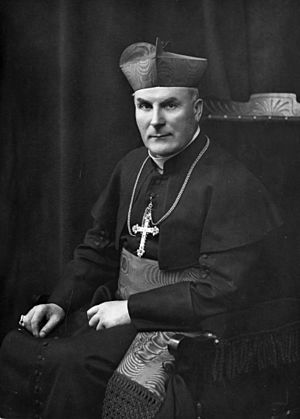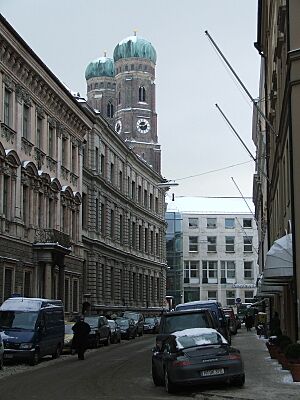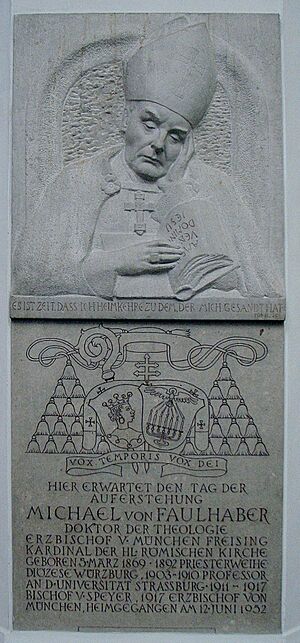Michael von Faulhaber facts for kids
Quick facts for kids His Eminence Michael von Faulhaber |
|
|---|---|
| Cardinal, Archbishop of Munich and Freising | |

Faulhaber around 1936
|
|
| Archdiocese | Munich and Freising |
| Appointed | 24 July 1917 |
| Enthroned | 3 September 1917 |
| Reign ended | 12 June 1952 |
| Predecessor | Franziskus von Bettinger |
| Successor | Joseph Wendel |
| Other posts | Cardinal-Priest of S. Anastasia |
| Orders | |
| Ordination | 1 August 1892 |
| Consecration | 19 February 1911 by Franziskus von Bettinger |
| Created Cardinal | 7 March 1921 |
| Rank | Cardinal-Priest |
| Personal details | |
| Birth name | Michael Faulhaber |
| Born | 5 March 1869 Klosterheidenfeld, Unterfranken, Kingdom of Bavaria |
| Died | 12 June 1952 (aged 83) Munich, Bavaria, West Germany |
| Nationality | German |
| Denomination | Catholic |
| Previous post | Bishop of Speyer (1911–1917) |
| Motto | vox temporis vox dei |
| Coat of arms |  |
Michael Ritter von Faulhaber (born March 5, 1869 – died June 12, 1952) was an important German Catholic leader. He served as the Archbishop of Munich for 35 years, from 1917 until his death in 1952. He became a Cardinal in 1921.
Cardinal von Faulhaber was a key member and co-founder of a group called Amici Israel (Friends of Israel). This group started in Rome in 1926. Its goal was to help Jewish and Christian people get along better.
After the Nazi Party took control of Germany in 1933, Cardinal von Faulhaber accepted the new government. He asked Catholic clergy (church leaders) to be loyal to the government. He also tried to keep good connections between the Nazi government and the Church. At the same time, he spoke out against some Nazi policies. This included the unfair treatment of clergy members. He also supported people who criticized the Nazis, like Fritz Gerlich, and helped others who were being persecuted. In 1937, he helped write an important letter from the Pope called Mit brennender Sorge. In 1951, he ordained Joseph Ratzinger, who later became Pope Benedict XVI, as a priest. He was the last Cardinal still alive who had been chosen by Pope Benedict XV.
Contents
Early Life and Church Career
Michael Faulhaber was born in Klosterheidenfeld, Bavaria. He was the third of seven children. His father was a baker. He went to schools in Schweinfurt and Würzburg. From 1887 to 1888, he was a cadet in the Bavarian army. In 1889, he joined a Catholic seminary in Würzburg. He became a priest on August 1, 1892.
Faulhaber worked as a priest in Würzburg for six years. He studied early Christian writings and earned a doctorate in theology in 1895. He also traveled to the Vatican, Italy, England, and Spain to study old manuscripts. In 1903, he became a professor of theology at the University of Strasbourg. He also wrote articles for the Catholic Encyclopedia.
In 1910, Faulhaber became the Bishop of Speyer. He was officially made bishop on February 19, 1911. In 1913, he was made a Knight by Prince Regent Ludwig. This honor added "von Faulhaber" to his name. In 1916, he received the Iron Cross during World War I. He was the first clergyman in Germany to get this award. He earned it for supporting troops as a military chaplain on the Western Front. In 1917, he became the Archbishop of Munich. In 1921, he was made a Cardinal.
Views on Government and Society
Faulhaber did not feel very loyal to the Weimar Republic, which was Germany's government after World War I. At a Catholic meeting in 1922, he said the Weimar Republic was a "betrayal." He believed it came about by overthrowing the old monarchies (kings and queens). He also disliked that it separated church and state. This upset many Catholics who supported the new republic.
Faulhaber supported a group called Amici Israël. He helped share their writings. He told preachers to avoid any statements that sounded "anti-Semitic" (against Jewish people). This group wanted to change some parts of the Good Friday prayer. They wanted to remove phrases that seemed to accuse Jewish people of treachery. The Vatican later closed the group in 1928. They said its ideas did not fit with the Church's spirit.
Faulhaber and the Nazi Party
Rise of the Nazi Party
Faulhaber helped stop Gustav von Kahr from supporting Hitler during the Beer Hall Putsch. This was an early attempt by Hitler to take power. Because Faulhaber spoke out against the Nazis, some of Hitler's supporters protested against him.
In 1923, Faulhaber said in a sermon that every human life was valuable, including that of a Jewish person. When a church official complained about the persecution of Catholics, he noted that Faulhaber was being attacked for speaking out against the persecution of Jews.
In 1924, Faulhaber spoke about Hitler's movement. He said that Germany's rebirth would need help from Christianity.
Before the elections in March 1933, Faulhaber did not tell Catholics who to vote for. This was different from some other bishops. Some people thought his neutral stance might have led to losses for the Catholic-aligned party.
On April 1, 1933, the Nazi government called for a boycott of all Jewish stores. German bishops talked about what to do. Faulhaber believed that protesting would only make things worse. He said the Church could not intervene to protect Jews at that time. He thought it would turn into a fight against Catholics too. He also believed Jews could help themselves.
Advent Sermons
In December 1933, Faulhaber gave five important sermons. These sermons were not directly against the Nazis' actions against Jews. Instead, they were against the idea of racial anti-Semitism that the Nazis were trying to bring into the Catholic Church. He gave these sermons in St. Michael's Church in Munich. So many people came that other nearby churches had to use loudspeakers to hear him.
The Nazi program said the Old Testament was bad for moral values. Faulhaber had been a professor of the Old Testament. In his sermons, he defended the Old Testament. He said he could not stay silent when "racial research" attacked the basics of Christianity. He especially defended it against Nazi ideas from Alfred Rosenberg.
Faulhaber said that God always punishes those who torment his "Chosen People," the Jews. He also stated, "No Roman Catholic approves of the persecutions of Jews in Germany." He praised the Jewish people for their "noblest religious values." These sermons comforted some people and angered others. Many Protestants and Jews, as well as Catholics, attended. The sermons were published as a book, but the Nazis later banned it.
Faulhaber on Persecution of Jews
In the early 1930s, Faulhaber called the Nazi persecution of Jews "unfair and painful." He did not support Nazi anti-Semitism. He was a main writer of the Pope's letter Mit Brennender Sorge, which spoke out against racism.
In November 1941, German Catholic bishops wrote a letter to protest Nazi actions against the Church. This letter did not mention Jewish people. Faulhaber thought that bringing up "the Jewish question" would harm Germany's reputation.
During Kristallnacht (a night of violence against Jews in 1938), Faulhaber helped the Chief Rabbi of Munich. He provided a truck to save items from the synagogue before it was destroyed. After his Advent sermons, uniformed Nazis came to Faulhaber's home. They shouted "Take the traitor to Dachau!" and broke his windows.
Racial Theory
Faulhaber's sermons in December 1933 spoke out against the "fundamental errors" in the Nazi racial theory. He defended the idea of racial tolerance. The Nazis were angry about these sermons. His home was shot at. Martin Niemöller, a Protestant pastor who was in concentration camps, called Faulhaber a "great and courageous man."
Some historians say that while Faulhaber opposed Nazi racism, he did not speak out enough for Jewish people themselves. They say he mainly defended Judaism and the Old Testament.
Faulhaber was a big help in writing the only Papal encyclical (a letter from the Pope) ever written in German, Mit brennender Sorge. He worked for three nights on a draft. This letter condemned the Nazis' worship of race and the state. It tried to stop the Nazis from changing Christianity to support racism. One historian called Faulhaber "one of the most fearless" German churchmen. He said Faulhaber spoke out against the treatment of Jews and Nazi ideas.
Rabbi David G. Dalin called him "a famous opponent of the Nazis." Another historian called him "the most articulate anti-Nazi in the Catholic hierarchy." Rabbi Stephen S. Wise, an American Jewish leader, called Faulhaber "a true Christian prelate." He said Faulhaber tried to protect Jews.
Relations with Hitler
Faulhaber, like other German Catholic leaders, wanted to work with the government. It was hard for them to believe that Hitler would use them for his own purposes and then break his promises.
In April 1933, a Bavarian official reported that Faulhaber had told clergy to support the new Nazi government. On March 12, 1933, Faulhaber met with Pope Pius XI in Rome. When he returned, he said the Pope had shown "greater tolerance" for the new government. He also said the Pope saw Hitler as the first statesman to speak out against Bolshevism (communism).
After Germany and the Holy See (the Pope's government) signed an agreement called the Concordat in 1933, Faulhaber congratulated Hitler. He wrote that Hitler had achieved in six months what old parliaments could not do in 60 years. He called the agreement with the Pope "a feat of immeasurable blessing." He ended his note by wishing that God would "preserve the Reich Chancellor for our people."
In June 1936, the German press reported that a Swiss Catholic had prayed for Hitler's death. This led to accusations that all Catholics were disloyal. Faulhaber responded in a sermon. He said that Catholics prayed for the Führer (Hitler) every Sunday, as promised in the Concordat. He then led a prayer for Hitler's life. After a failed attempt to kill Hitler in 1943, Faulhaber held a special mass. He celebrated Hitler's survival.
Faulhaber Meets Hitler
In August 1936, German bishops met. They discussed the Spanish Civil War. The bishops accepted the Nazi view that communists were involved in the war. They said German unity should be strong to free Europe from Bolshevism.
A church official arranged a private meeting between Faulhaber and Hitler. On November 4, 1936, Faulhaber went to Hitler's mountain home. Hitler spoke a lot, saying he was disappointed in the Church. He complained about attacks on the Church. The meeting ended with both sides not fully understanding each other.
Faulhaber wrote notes about the meeting. He said Hitler "spoke openly, confidentially, emotionally." Hitler talked about Bolshevism and Jews. Faulhaber noted that Hitler seemed to believe in God and saw Christianity as important for Western culture. Faulhaber left the meeting thinking Hitler was "deeply religious."
Faulhaber told other bishops that he had promised Hitler they would condemn Bolshevism. He also said they would confirm their loyalty to the government and the Führer. On December 24, 1936, the German bishops told priests to read a letter called On the Defense against Bolshevism. This letter said the Church's support against Bolshevism would be stronger if the Church had more freedom. It also praised Hitler for seeing the danger of Bolshevism.
Opposition to Nazi Policies
In June 1933, Faulhaber complained to Hitler about violence against Catholics and the arrest of priests. He said religious freedom was threatened. Later, he complained about new rules that limited the Church. In June 1937, he spoke out against the arrest of a priest named Rupert Mayer during a sermon. The German bishops asked that Catholics not be forced to act against their beliefs. Faulhaber said that bishops could not stay silent when state laws went against God's commands.
In September 1939, Hitler ordered the killing of people with incurable diseases. This program was secret at first. When word got out, Faulhaber was one of the bishops who protested. He wrote to the Minister of Justice, saying he could not stay silent when moral foundations were at risk.
In April 1941, the Nazis wanted to remove crucifixes from classrooms. This led to protests by ordinary Catholics. The ban was dropped. Faulhaber criticized the ban. He said German soldiers were called "crusaders against Bolshevism." He felt this title was not deserved if a "war is declared" against Christianity at home.
Annexation of Austria and Czechoslovakia
In March 1938, the Nazis took over Austria. Faulhaber recommended that church bells be rung. He also asked the faithful to pledge loyalty to Hitler and pray for peace between Church and State. The bells were rung, but the Bavarian bishops did not mention Hitler.
In October 1938, the Nazis took over parts of Czechoslovakia. Many people were relieved that war was avoided. Faulhaber suggested sending a telegram to Hitler from the German bishops. The telegram congratulated and thanked Hitler for "safeguarding international peace." It also ordered church bells to ring.
War with the Soviet Union
In June 1941, the Nazis attacked the Soviet Union. This made the bishops support the fight against Bolshevism even more. When church bells were taken for the war effort, Faulhaber said it was a sacrifice for the "dear fatherland." He said it was needed for a successful end to the war and to defeat Bolshevism. As the war turned against the Nazis, Faulhaber defended the Church. He said no one could wish for the war to fail. He believed that if it did, the state, the Church, and society would be destroyed by "Russian chaos."

Negotiating the Concordat
Faulhaber also helped Cardinal Pacelli negotiate the Reichskonkordat. This was an agreement signed on July 20, 1933. The Church often signed such agreements with countries. This Concordat aimed to protect Catholics from violence. It also sought to challenge Nazi racial ideas.
Faulhaber believed Hitler wanted the Concordat for propaganda. He advised caution. He said Hitler would gain respect if the Pope made a treaty with him. He also wondered why German Catholics would agree when many Catholic officials were in prison.
Faulhaber and Pacelli hoped the Concordat would give them a legal way to fight against the violent actions against the Church. Pacelli reportedly said he had to choose between an agreement and the Church being "virtually eliminated." He felt like a "pistol had been held to his head."
After the Concordat was signed, Faulhaber sent a letter to Hitler. He said the agreement with the Pope was "a feat of immeasurable importance" for Germany's reputation. In a 1937 sermon, Faulhaber said that the Catholic Church, the "greatest moral power on earth," showed confidence in the new German government through the Concordat. He said this was very important for the government's reputation abroad.
Faulhaber also asked for amnesty (forgiveness) for victims in concentration camps. The bishops of Austria, outside Nazi control at the time, said the Concordat did not mean the Church approved of Nazi religious errors. They said the Church never agreed with Nazi ideas like "race madness," "violent anti-Semitism," and "extreme nationalism."
In 1933, Faulhaber criticized the violent nature of the Nazi leadership. He said a state based on right should win over a state based on might. This speech was seen as opposition to Hitler's rule. In his Advent 1933 sermon, he said, "Let us not forget that we were saved not by German blood but by the blood of Christ!" This was a response to Nazi racism. The SS (Nazi police) saw this sermon as supporting Jews.
In 1934, someone shot at the cardinal's office. In 1935, some Nazis called for Faulhaber to be killed. In 1949, a Jewish organization in Bavaria thanked Faulhaber. They said they would never forget how he "with unseen courage" defended the Old Testament and "saved thousands of Jewish persons from terror and lethal violence."
Views on Communism
Cardinal Faulhaber spoke out against communism many times. He did so in 1919, 1930, and from 1935 until late 1941. After World War II, he continued to publicly attack "Bolshevism" (communism).
After the War
| Styles of Michael von Faulhaber |
|
|---|---|
 |
|
| Reference style | His Eminence |
| Spoken style | Your Eminence |
| Informal style | Cardinal |
| See | Munich |
After the war, Faulhaber said German Jews should be welcomed back. He offered to pay for their travel costs to Germany. He received thanks from the Jewish Community Centre. They noted his kind attitude towards Jews in Munich during the time of persecution. Faulhaber called anti-Semitism a "scourge of mankind." He promised to convince Catholics in Bavaria to remove all remaining anti-Semitism from their hearts. He also said he would ask the Pope to write a letter about anti-Semitism.
Legacy
Faulhaber is still a debated figure. The Nazis reportedly saw him as a "friend of the Jews." Some historians believe his advice to Cardinal Pacelli (to stay silent because speaking out might make things worse) influenced Pacelli's later actions. In a 1998 Vatican document, Faulhaber's 1933 Advent sermons were praised for rejecting "Nazi anti-Semitic propaganda."
Awards and Honors
- Grand Cross of Merit of the Federal Republic of Germany (1951)
- Knight of the Order of Saint Hubert
- Iron Cross of 1914, 2nd class
- Military Merit Order, 1st class (Bavaria)
- Order of St. Alexander (Bulgaria)
Images for kids
See also
 In Spanish: Michael von Faulhaber para niños
In Spanish: Michael von Faulhaber para niños
 | Toni Morrison |
 | Barack Obama |
 | Martin Luther King Jr. |
 | Ralph Bunche |



